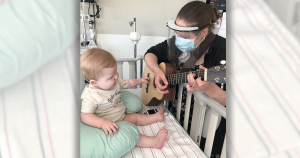Music therapy
It’s no secret that music can be uplifting and relaxing in any situation.  A growing amount of evidence suggests that the power of music can also have significant benefits to patients and their families in clinical settings. Your child doesn’t need a musical background to benefit from music therapy. Children at any developmental age or developmental level can participate. Children’s Minnesota board-certified music therapists serve patients ranging from newborns to young adults at various levels of engagement and responsiveness (from sedated to active).
A growing amount of evidence suggests that the power of music can also have significant benefits to patients and their families in clinical settings. Your child doesn’t need a musical background to benefit from music therapy. Children at any developmental age or developmental level can participate. Children’s Minnesota board-certified music therapists serve patients ranging from newborns to young adults at various levels of engagement and responsiveness (from sedated to active).
What is music therapy?
Music therapy is an evidence-based allied health profession that uses the clinical applications of music to meet individualized non-musical goals. These goals could be physical, cognitive, emotional, or social. At Children’s Minnesota, patients are seen for individual, group, or family music therapy sessions.
